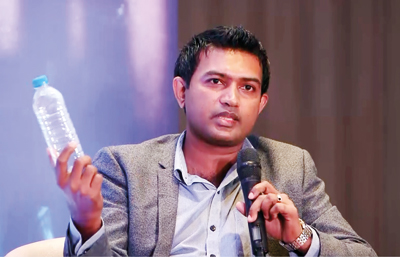Eco Spindles promotes responsible recycling at CFW’s Fashion Summit
View(s):
Mr. Nalaka Seneviratne
Sri Lanka’s largest plastic recycler Eco Spindles was among industry experts in an invaluable panel discussion themed ‘Circularity in a Fashion Supply Chain’ held at the recently concluded Responsible Fashion Summit organised by the Colombo Fashion Week (CFW).
Representing Eco Spindles at the discussion, Chief Executive Officer at Eco Spindles Yarns, Nalaka Seneviratne elaborated on how Eco Spindles currently operates and provided insightful details on the recycling economy in Sri Lanka, the company explained in a media release.
“A regular PET bottle generally takes thousands of years to completely degrade. Around 600 billion bottles are being improperly disposed of globally. If these bottles were lined up next to one another, the line would make around 730 rounds around the Earth! However, if properly disposed of and recycled, once the bottles are converted into polyester yarn to create garments, this will cut down the degradation span by around 900 years,” said Mr. Seneviratne.
He elaborated on the state of PET plastic waste in Sri Lanka noting that “Sri Lankans throw out around 300 million bottles – equivalent to 1,500 metric-tonnes – every month, but recycle only 50 million bottles – 250 metric-tonnes – in the same period. In comparison, our neighbours in India recycle 80 per cent of their recyclable waste, while we only do 20 per cent.”
With Eco Spindles’ recent expansion at its facility in Horana, its capacities will more than double, and the recycler is seeking to implement a third expansion by 2023, with confidence that it can further reduce the sheer amount of waste that is not collected in the country.
“However, we cannot do this alone. Support, starting from the household level to the national level is essential, if we are to collectively make a difference in this country’s waste management system. The Government has also commended our efforts, and is very supportive to work towards strengthening the recycling industry,” said Mr. Seneviratne. “What we need from them right now however, is an elaborate waste management strategy to manage PET plastics.”
The recycler also plays a pivotal role in raising awareness on the topic of PET waste management and recycling, and very recently introduced ‘Waste 2 Value’, a smartphone app capable of locating designated PET waste bins with much more convenience for the end-consumers.
The app provides users with a GPS-enabled map, with bin icons indicated around the country, so that they can easily locate and dispose of their plastic waste the right way. It can currently locate around 300 bins, but “we are looking at expanding this to 1,000 bins within the year,” Mr. Seneviratne added.
He explained that using recycled raw materials instead of virgin raw materials in the manufacturing process is much more sustainable, as recycled materials will consume 47 per cent less energy, 35 per cent less greenhouse gas emissions and 20 per cent less water when creating an end-product.



